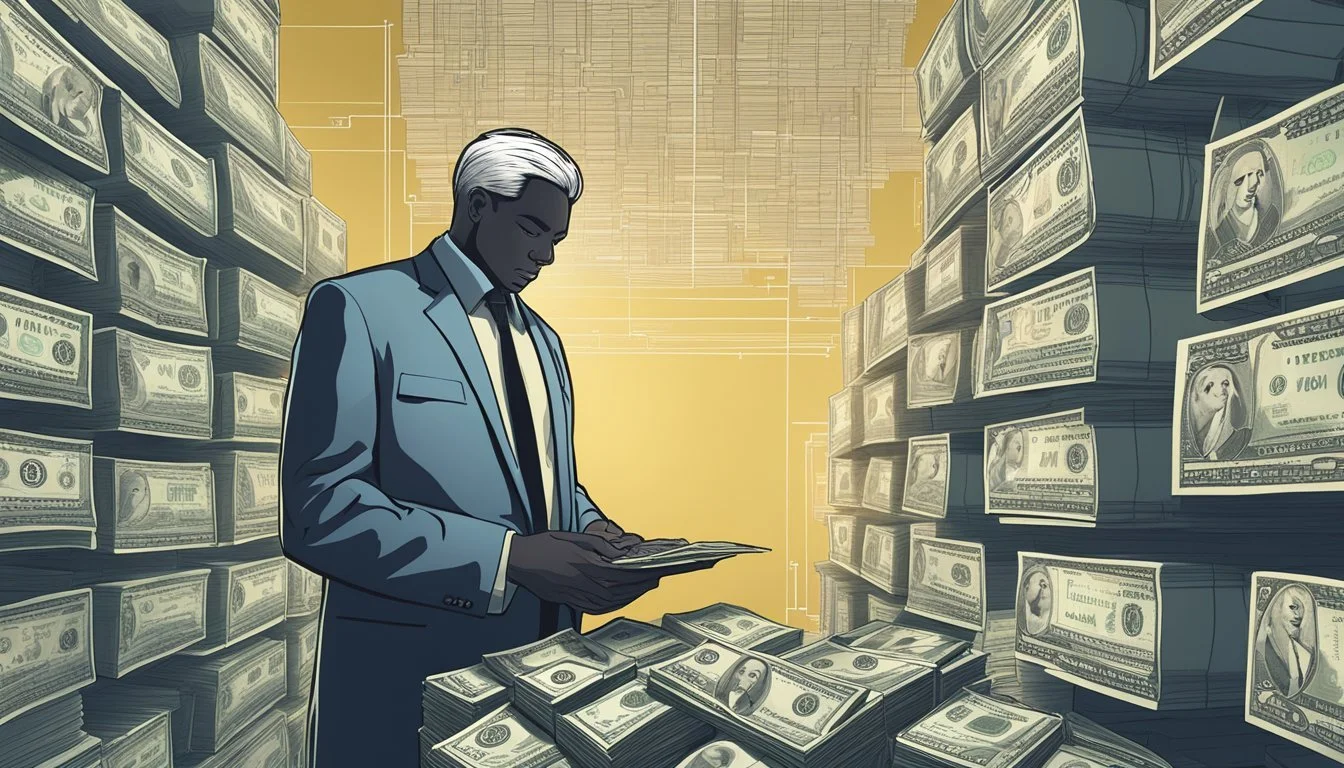10 Riveting Documentaries on Notorious Confidence Tricks and Long Cons
Unmasking History's Greatest Scams
Confidence tricks and long cons have captivated audiences for decades, revealing the depths of human deception and manipulation. From small-time grifters to elaborate schemes spanning years, these audacious scams expose both the ingenuity of con artists and the vulnerabilities of their victims. Documentaries exploring these notorious frauds provide a window into the psychology, methods, and consequences of some of history's most infamous confidence games.
The world of cons is filled with colorful characters, outrageous plots, and shocking revelations that often seem stranger than fiction. Filmmakers have documented many of these real-life capers, shedding light on the techniques used by swindlers to exploit trust and greed. These riveting accounts serve as cautionary tales while simultaneously satisfying viewers' curiosity about the criminal underworld.
1) The Imposter
"The Imposter" is a 2012 documentary directed by Bart Layton that explores an astonishing case of identity theft. The film recounts the story of Frédéric Bourdin, a French con artist who successfully impersonated Nicholas Patrick Barclay, a Texas boy who vanished at age 13 in 1994.
Bourdin, despite being seven years older and having different physical features, managed to convince Barclay's family that he was their missing son. The documentary uses a blend of interviews and dramatic reenactments to tell this incredible tale.
The film delves into the psychology behind Bourdin's deception and the family's willingness to believe him. It raises thought-provoking questions about the nature of truth and the power of self-deception.
"The Imposter" received critical acclaim for its gripping storytelling and innovative approach to documentary filmmaking. It offers a fascinating look into one of the most audacious confidence tricks in recent history.
2) Catch Me If You Can
"Catch Me If You Can" is a gripping documentary that explores the audacious exploits of Frank Abagnale Jr. This real-life con artist managed to impersonate various professionals and forge checks worth millions of dollars before his 21st birthday.
The film delves into Abagnale's incredible journey as he assumes the identities of a pilot, doctor, and lawyer. It showcases his remarkable ability to manipulate systems and people, evading capture for years.
FBI agent Carl Hanratty's relentless pursuit of Abagnale forms a central part of the narrative. Their cat-and-mouse game spans continents and years, highlighting the challenges law enforcement faced in tracking down this elusive fraudster.
The documentary provides insight into Abagnale's motivations and the societal factors that allowed his schemes to succeed. It examines the vulnerabilities in security systems of the 1960s that he expertly exploited.
Abagnale's eventual capture and subsequent transformation into a security consultant add an intriguing twist to his story. The film explores how he used his unique experiences to help prevent fraud and improve security measures.
3) The Great Hack
"The Great Hack" is a 2019 documentary that explores the Cambridge Analytica data scandal. Directed by Jehane Noujaim and Karim Amer, the film premiered at the Sundance Film Festival and later became available on Netflix.
The documentary delves into how personal data became a valuable commodity in the digital age. It focuses on the controversial practices of Cambridge Analytica, a now-defunct political consulting firm.
Key figures featured in the film include David Carroll, an academic who sought to reclaim his data, and Brittany Kaiser, a former Cambridge Analytica employee turned whistleblower. Their stories provide insight into the complex world of data mining and manipulation.
"The Great Hack" examines the impact of data exploitation on democracy, particularly in relation to the 2016 U.S. presidential election and the Brexit referendum. The film raises important questions about privacy, consent, and the power of information in the modern world.
Through interviews, graphics, and archival footage, the documentary paints a compelling picture of how personal information can be weaponized for political gain. It serves as a wake-up call about the potential dangers of unchecked data collection and targeted advertising.
4) Man on Wire
"Man on Wire" documents the audacious 1974 high-wire walk between New York's Twin Towers by Philippe Petit. The film captures Petit's meticulous planning and execution of this unauthorized feat.
Director James Marsh skillfully weaves archival footage with modern-day interviews. He reveals the intricate details of Petit's daring scheme and the team that helped him achieve it.
The documentary explores Petit's background as a street performer and his obsession with wire-walking. It chronicles his previous high-profile stunts, including walks between the towers of Notre Dame Cathedral.
Marsh builds tension by presenting the World Trade Center walk as a heist film. The audience follows Petit and his accomplices as they sneak into the buildings and set up their equipment under cover of darkness.
The film's climax showcases Petit's breathtaking 45-minute performance 1,350 feet above the ground. Through firsthand accounts and photographs, viewers experience the awe and disbelief of onlookers who witnessed this incredible act.
"Man on Wire" won numerous awards, including the Academy Award for Best Documentary Feature in 2009. It stands as a testament to human ambition and the pursuit of seemingly impossible dreams.
5) Fyre: The Greatest Party That Never Happened
"Fyre: The Greatest Party That Never Happened" exposes the infamous 2017 Fyre Festival debacle. The Netflix documentary chronicles the rise and fall of this luxury music event that spectacularly failed to deliver on its promises.
Promoted as an exclusive island getaway with high-end accommodations and performances by top musicians, Fyre Festival quickly descended into chaos. Attendees arrived to find inadequate shelter, scarce food, and none of the advertised amenities.
The film reveals how entrepreneur Billy McFarland and rapper Ja Rule orchestrated an elaborate social media campaign to sell tickets. It features interviews with festival organizers, employees, and attendees, providing multiple perspectives on the unfolding disaster.
Footage shows the frantic behind-the-scenes efforts to salvage the event as reality set in. The documentary also explores the aftermath, including legal consequences for the organizers and the impact on local Bahamian workers left unpaid.
"Fyre" offers a cautionary tale about the power of social media marketing and the dangers of unchecked ambition. It garnered critical acclaim and multiple Emmy nominations for its in-depth look at one of the most notorious scams in recent memory.
6) Dirty Money
"Dirty Money" is a Netflix documentary series that exposes corporate corruption and financial misconduct. The show premiered in 2018 and features six hour-long episodes in its first season.
Each episode focuses on a different case of corporate malfeasance, ranging from corporate fraud to creative accounting practices. The series is executive produced by Oscar-winning filmmaker Alex Gibney.
One notable episode titled "The Confidence Man" examines Donald Trump's business practices and financial strategies. It explores his use of media exposure and navigation through real estate booms and busts.
Another episode, "The Maple Syrup Heist," investigates an unusual theft of $20 million worth of maple syrup in Canada. This case highlights the surprising value of maple syrup in the country's economy.
The series has received positive critical feedback, earning a 100% rating on Rotten Tomatoes. "Dirty Money" provides viewers with in-depth looks at various forms of financial corruption and corporate wrongdoing.
7) American Greed
American Greed is a long-running documentary series that premiered in 2007 on CNBC. The show focuses on high-profile financial crimes and corporate fraud cases in the United States.
Each episode delves into a different story of white-collar crime, exploring the methods used by con artists and fraudsters to deceive their victims. The series covers a wide range of schemes, from Ponzi schemes to insider trading.
Narrated by Stacy Keach, American Greed provides detailed accounts of how these crimes were committed and eventually uncovered. The show often features interviews with law enforcement officials, victims, and sometimes even the perpetrators themselves.
Notable cases covered in the series include the infamous Bernie Madoff Ponzi scheme and the fraudulent activities of "pharma bro" Martin Shkreli. The show has aired for over 15 seasons, demonstrating its enduring popularity among viewers.
American Greed serves as both a cautionary tale and an educational tool, highlighting the devastating impact of financial crimes on individuals and communities. It sheds light on the complex nature of these offenses and the efforts required to bring perpetrators to justice.
8) The Tinder Swindler
The Tinder Swindler is a gripping Netflix documentary directed by Felicity Morris. It exposes the fraudulent activities of Simon Leviev, an Israeli man who deceived multiple women across Europe.
Leviev crafted an elaborate persona as the heir to a diamond fortune. He used the popular dating app Tinder to meet wealthy women and gain their trust.
Once he established relationships, Leviev claimed to be in danger and urgently needed money. His victims, believing his stories, provided him with substantial sums.
The documentary features interviews with several of Leviev's victims. They recount their experiences and the emotional and financial toll of his deception.
Estimates suggest Leviev swindled close to $10 million from the women he conned. The film highlights the sophisticated nature of his scheme and its far-reaching impact.
The Tinder Swindler serves as a cautionary tale about the potential dangers of online dating. It also explores themes of trust, manipulation, and the power of digital personas in modern relationships.
9) Billion Dollar Heist
"Billion Dollar Heist" is a 2023 documentary that explores one of the most audacious cyber heists in history. The film delves into the 2016 Bangladesh Bank robbery, where hackers attempted to steal a staggering $1 billion.
Directed by Daniel Gordon, Brendan Donovan, and Bryn Evans, the documentary combines expert commentary with visual explanations to break down the complex digital crime. It traces the evolution of cybercrime from basic credit card fraud to sophisticated global criminal operations.
The film reveals how the hackers infiltrated the world's most secure banking systems, crossing continents and time zones in their pursuit of the massive sum. A simple spelling mistake prevented them from making off with the full billion dollars.
Viewers are guided through the intricacies of the heist, learning how the criminals exploited vulnerabilities in the financial system. The documentary draws comparisons to the fictional heist in "Ocean's Eleven," highlighting the real-world audacity of the cyber thieves.
"Billion Dollar Heist" offers a hair-raising account of modern financial crime, illustrating the growing threat of cybercrime to global banking institutions. It serves as a stark reminder of the vulnerabilities in our increasingly digital financial world.
10) The Fall of the Lehman Brothers
The collapse of Lehman Brothers in 2008 marked a pivotal moment in the global financial crisis. This once-storied investment bank, founded in 1847, had survived major historical events like the Civil War and Great Depression.
Under CEO Richard Fuld's leadership, Lehman Brothers expanded aggressively into the subprime mortgage market. As housing prices declined and mortgage defaults rose, the firm's investments lost substantial value.
On September 15, 2008, Lehman Brothers filed for Chapter 11 bankruptcy protection. This came after a mass exodus of clients, steep stock losses, and credit rating downgrades of its assets.
The firm's failure sent shockwaves through the financial system. It precipitated a credit freeze and exacerbated the ongoing economic downturn, leading to what became known as the Great Recession.
Documentaries on the subject examine the tense negotiations in New York and London as Lehman spiraled towards bankruptcy. They explore the decisions made by key players and the broader economic factors at play.
The fall of Lehman Brothers has become a cautionary tale about excessive risk-taking and the interconnectedness of the global financial system.
The Art of the Confidence Trick
Confidence tricks have a long history of exploiting human psychology and social dynamics. These elaborate schemes rely on manipulating trust and desire to deceive victims out of money or assets.
Historical Overview
Confidence tricks date back centuries. In 19th century America, newspapers frequently reported on "confidence men" running scams. These early con artists often targeted immigrants and travelers unfamiliar with local customs.
As society evolved, so did the tricks. The Great Depression saw a rise in bible-selling cons targeting vulnerable widows. Moses Pray, depicted in the film "Paper Moon," exemplified this type of fraudster.
More sophisticated long cons emerged in the 20th century. Victor Lustig, known for "selling" the Eiffel Tower, perfected the art of the extended deception. His polished charm and meticulous planning allowed him to extract enormous profits from victims.
Psychology of Victims
Con artists exploit fundamental human desires and cognitive biases. The promise of quick wealth or exclusive opportunities appeals to greed and fear of missing out. Scammers create a false sense of urgency to prevent rational decision-making.
Victims often believe they're too smart to be fooled. This overconfidence makes them vulnerable. Con artists use social proof and authority to build trust quickly. They may pose as successful businesspeople or officials.
The "sunk cost fallacy" keeps victims invested even as doubts arise. Many feel ashamed to admit they've been conned, allowing scams to continue. Understanding these psychological factors is crucial for recognizing and avoiding confidence tricks.
Infamous Long Cons
Long cons involve elaborate schemes that unfold over extended periods, often targeting wealthy individuals or institutions. These complex deceptions require meticulous planning, convincing backstories, and the ability to maintain falsehoods for months or years.
Notable Techniques
The "Spanish Prisoner" con dates back to the 16th century. Scammers claim to be imprisoned aristocrats, promising riches in exchange for help. Modern versions include email scams from purported foreign officials.
David Hampton's 1980s New York con involved impersonating Sidney Poitier's son. He exploited people's desire for celebrity connections, swindling thousands from wealthy marks before his arrest.
The "Bunco" game scam, perfected by Joseph "Hungry Joe" Lewis in 19th-century New York, lured rich targets into rigged parlor games. Lewis's success earned him the title "King of the Bunco Men."
Unraveling Complex Schemes
Frédéric Bourdin's impersonation of Nicholas Barclay, a missing Texas boy, stands out for its audacity. Bourdin, a French con artist, convinced Barclay's family he was their long-lost relative despite significant age and appearance differences.
Documentaries like "The Imposter" (2012) provide in-depth looks at these intricate deceptions. They explore the psychological tactics used by con artists and the vulnerabilities they exploit in their victims.
Filmmakers use interviews, reenactments, and archival footage to piece together the timeline of events. This approach helps viewers understand how these elaborate schemes unfold and ultimately unravel.





